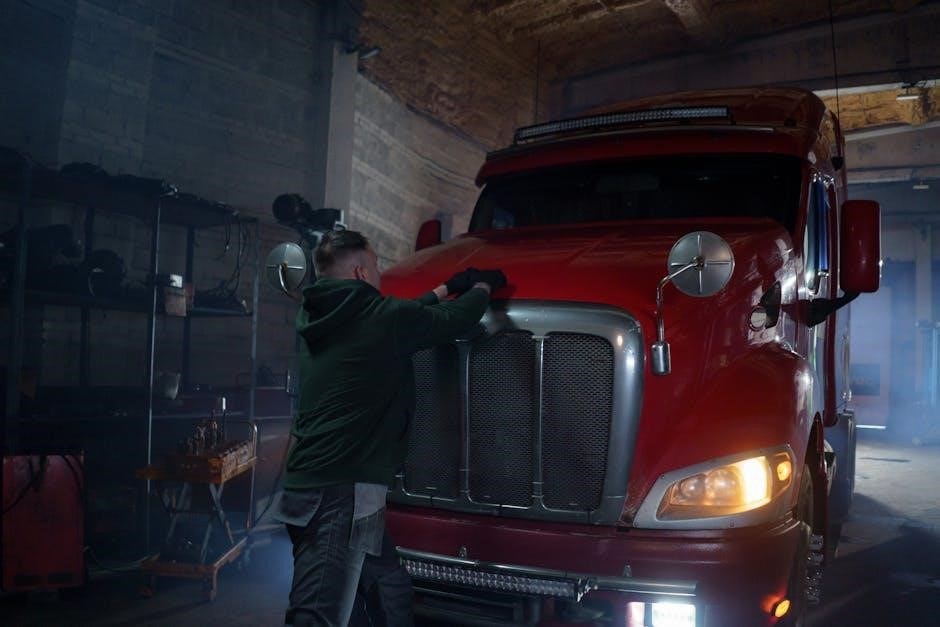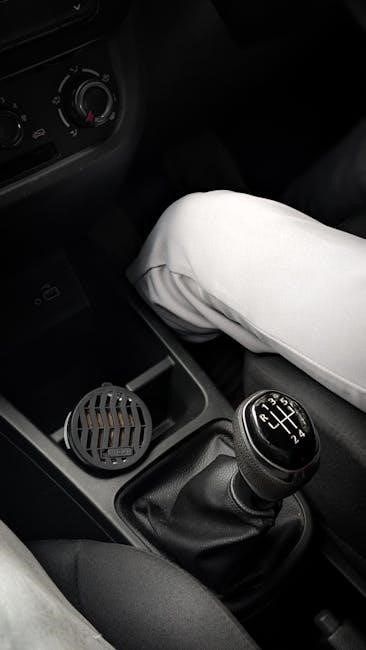The Michigan CDL Program ensures safe operation of commercial vehicles by setting standards for licensing. It requires applicants to meet specific eligibility criteria‚ pass rigorous tests‚ and adhere to federal regulations. The program is supported by the Michigan Commercial Driver License Manual‚ a comprehensive guide for CDL applicants and holders‚ covering essential topics like medical certification‚ driver qualifications‚ and safe driving practices.
1.1 Overview of the CDL Program in Michigan
The Michigan CDL Program is designed to ensure safe and efficient operation of commercial motor vehicles (CMVs). It regulates licensing for drivers operating vehicles exceeding 10‚001 pounds or transporting hazardous materials. The program aligns with federal standards‚ requiring applicants to meet age‚ residency‚ and medical criteria. Drivers must pass written and skills tests to obtain a CDL‚ which is classified into types (A‚ B‚ C) based on vehicle weight and type. The program also includes endorsements for specialized cargo and restrictions for certain violations. Its goal is to maintain road safety and compliance with federal and state transportation regulations.
1.2 Importance of the CDL Manual
The Michigan CDL Manual is a vital resource for commercial driver license applicants and holders. It provides detailed information on eligibility requirements‚ testing procedures‚ and safe driving practices. The manual covers topics such as medical certification‚ driver qualifications‚ and federal regulations. It serves as a comprehensive study guide for the written and skills tests‚ ensuring applicants are well-prepared. Additionally‚ it outlines the classification of CDLs‚ endorsements‚ and restrictions‚ helping drivers understand their specific licensing needs. Regular updates keep the manual current with state and federal laws‚ making it an essential tool for maintaining compliance and road safety.

Eligibility Requirements for a Michigan CDL
To obtain a Michigan CDL‚ applicants must meet age‚ residency‚ and medical requirements. They must also comply with federal driver qualification standards and pass mandatory tests.
2.1 Age Requirements for CDL Applicants
In Michigan‚ CDL applicants must meet specific age requirements. For intrastate commerce‚ drivers can operate a commercial motor vehicle (CMV) at 18 years old‚ except when transporting hazardous materials requiring placarding‚ which mandates a minimum age of 21. Interstate CMV operation requires applicants to be at least 21 years old. These age restrictions ensure maturity and experience‚ aligning with federal and state safety standards. Applicants under 21 are restricted to intrastate operations and cannot transport hazardous materials in quantities requiring placarding. Age verification is a critical step in the CDL application process to comply with these regulations.
2.2 Residency and Citizenship Requirements
To apply for a Michigan CDL‚ applicants must meet residency and citizenship requirements. They must be U.S. citizens or lawful permanent residents and provide proof of Michigan residency. Non-citizens must provide valid immigration documents. Applicants are required to submit documentation‚ such as a birth certificate or passport‚ to verify citizenship. Proof of residency can include utility bills‚ lease agreements‚ or other official documents. These requirements ensure compliance with state and federal regulations. Meeting these criteria is essential for processing the CDL application and obtaining the necessary credentials to operate commercial vehicles legally in Michigan.
2.3 Medical Certification for CDL Holders
CDL holders in Michigan must meet federal medical certification requirements to ensure they are physically qualified to operate commercial vehicles. Applicants must undergo a physical examination by an FMCSA-approved Medical Examiner and submit a Medical Examiner’s Certificate. The certification process involves meeting specific health standards‚ including vision‚ hearing‚ and physical ability tests. Drivers must maintain current certification to keep their CDL valid. Failure to comply with medical requirements can result in license suspension. The Michigan CDL Manual provides detailed guidance on medical certification processes and necessary documentation to help drivers stay compliant with federal and state regulations.
2.4 Driver Qualification Requirements
CDL applicants in Michigan must meet federal and state driver qualification standards. This includes passing a physical examination by an FMCSA-certified Medical Examiner‚ maintaining a clean driving record‚ and completing all required paperwork. Drivers must also comply with federal regulations‚ such as those related to hours of service and vehicle inspection. Additionally‚ applicants must provide proof of residency and citizenship. The Michigan CDL Manual outlines these requirements in detail‚ ensuring drivers are qualified to operate commercial vehicles safely and legally. Failure to meet these standards can result in disqualification from obtaining or maintaining a CDL.

Classification of Commercial Driver Licenses (CDLs)
CDLs are classified into three main types: Class A‚ B‚ and C‚ based on vehicle weight and type. Endorsements and restrictions further customize licensing for specific operations.
3.1 Types of CDLs (Class A‚ B‚ and C)
In Michigan‚ CDLs are categorized into three classes based on vehicle type and weight. Class A allows operation of combination vehicles with a Gross Vehicle Weight Rating (GVWR) of 26‚001 pounds or more‚ pulling a trailer over 10‚001 pounds. Examples include tractor-trailers and big rigs. Class B covers heavy straight trucks like dump trucks and box trucks‚ with a GVWR of 26‚001 pounds or more. Class C is for smaller vehicles‚ such as passenger vans and hazardous material transport‚ requiring a CDL regardless of weight if hazardous materials are involved.
3.2 CDL Endorsements and Restrictions
CDL endorsements and restrictions in Michigan are added to a license based on specific qualifications and limitations. Endorsements‚ such as H (hazardous materials) or N (tank vehicles)‚ require additional testing. Restrictions‚ like E (no manual transmission CMVs)‚ limit driving privileges. These designations ensure drivers operate only vehicles they are qualified to handle. Violating endorsement or restriction rules can lead to penalties. Understanding these codes is crucial for compliance and safe operation of commercial vehicles in Michigan.
The CDL Application Process in Michigan
Applying for a CDL in Michigan involves submitting required documents‚ paying fees‚ and passing written and skills tests. The process ensures only qualified drivers obtain a CDL.
4.1 Steps to Apply for a CDL

To apply for a CDL in Michigan‚ follow these steps: Review the Michigan Commercial Driver License Manual to understand requirements. Complete a vision test and submit necessary documents‚ such as proof of residency and citizenship. Pass the written knowledge test(s) for your desired CDL class and endorsements. Schedule and pass the CDL skills test‚ which includes a pre-trip inspection‚ basic vehicle control‚ and on-road driving. Once all tests are passed‚ submit your application and pay the required fees to obtain your CDL. Ensure all federal and state regulations are met throughout the process.
4.2 Required Documents for CDL Application
To apply for a CDL in Michigan‚ you must provide specific documents. These include proof of identity‚ residency‚ and citizenship‚ such as a valid passport or birth certificate. You must also submit a Social Security card or equivalent. Additionally‚ a completed Medical Examiner’s Certificate is required‚ ensuring you meet federal medical standards. If applicable‚ provide proof of legal name changes‚ such as a marriage certificate. All documents must be valid and unexpired. Refer to the Michigan Commercial Driver License Manual for a detailed list of acceptable documents to ensure a smooth application process.
4.3 CDL Application Fees
The fees for applying for a CDL in Michigan vary based on the type of license and endorsements. The base fee for a CDL is determined by the Michigan Secretary of State’s office. Additional costs may apply for endorsements‚ such as hazardous materials or passenger transport. Payment is typically required at the time of application and can be made using accepted methods like cash‚ credit cards‚ or checks. For the most accurate and up-to-date fee information‚ visit the Michigan Secretary of State’s official website or consult the Michigan Commercial Driver License Manual.
4.4 Disqualifications and Penalties
CDL disqualifications and penalties in Michigan ensure safe and responsible commercial driving. Common offenses leading to disqualification include reckless driving‚ DUI‚ and serious traffic violations. Penalties may involve fines‚ license suspension‚ or revocation. Repeat offenses can result in permanent disqualification. Medical non-compliance or falsifying records also lead to penalties. These measures uphold public safety and maintain high standards for CDL holders. Understanding these consequences is crucial for maintaining a valid CDL and avoiding legal repercussions.

CDL Testing and Examination
The CDL testing process in Michigan includes written and skills tests to ensure applicants meet federal and state standards. Proper preparation is essential for success.
5.1 Types of CDL Tests
The Michigan CDL program includes several tests to ensure driver competency. The written test covers federal and state regulations‚ safety practices‚ and knowledge specific to the type of CDL. The skills test evaluates practical abilities‚ including vehicle inspection‚ basic control maneuvers‚ and on-road driving. Additionally‚ applicants may need to take endorsement tests for specialized cargo‚ such as hazardous materials or passenger transport. Each test is designed to verify the applicant’s understanding and ability to operate a commercial vehicle safely and legally.
5.2 Preparing for the CDL Written Test
Preparing for the CDL written test requires thorough study of the Michigan Commercial Driver License Manual. The manual covers federal and state regulations‚ safe driving practices‚ and specific requirements for each CDL class. Focus on understanding traffic laws‚ road signs‚ and cargo handling. Additional resources‚ such as online practice tests and CDL handbooks‚ can supplement your study. Pay attention to sections on vehicle inspection‚ hazardous materials‚ and endorsements. Regularly reviewing and practicing with sample questions will help improve your readiness for the test and ensure a strong understanding of the material.
5.3 Preparing for the CDL Skills Test
Preparing for the CDL skills test involves mastering three key areas: pre-trip inspection‚ basic vehicle control‚ and on-road driving. Study the Michigan Commercial Driver License Manual to understand the inspection process and identify potential vehicle issues. Practice backing‚ turning‚ and parking maneuvers in a controlled environment. Focus on smooth acceleration‚ braking‚ and shifting gears. On-road driving should demonstrate safe lane changes‚ merging‚ and adherence to traffic laws. Review the manual’s scoring criteria to avoid common errors. Regular practice and feedback from a qualified instructor will help refine your skills and build confidence for the test.

Maintaining Your CDL
Maintaining your CDL requires regular medical certification‚ adherence to federal regulations‚ and staying informed about updates. The Michigan Commercial Driver License Manual provides essential guidance for CDL holders.
6.1 Medical Certification Requirements
CDL holders in Michigan must meet federal medical certification standards to ensure they are physically qualified to operate commercial vehicles safely. The Michigan Commercial Driver License Manual outlines these requirements‚ emphasizing that drivers must undergo periodic medical examinations conducted by FMCSA-certified professionals. The medical certificate must be carried while driving and submitted to the state. Failure to maintain valid medical certification can result in CDL suspension. Specific rules apply to intrastate drivers‚ with exemptions for certain operations. Compliance with these standards is critical to maintaining CDL privileges and road safety.
6.2 CDL Renewal Process
The CDL renewal process in Michigan requires drivers to submit updated documentation and fees before their license expires. The Michigan Commercial Driver License Manual details the steps‚ including completing a renewal application and providing proof of medical certification. Drivers must renew their CDL every 4 years‚ with some exceptions for hazardous materials endorsements. Renewal can be done online or in person at a Secretary of State office. Failure to renew on time may result in penalties or license suspension. It’s crucial to ensure all information is up to date to maintain CDL privileges without interruption.
6.3 Updating CDL Information
Updating CDL information in Michigan is essential to maintain accurate records. Drivers must notify the Secretary of State within 10 days of any changes‚ such as name‚ address‚ or medical status. The Michigan Commercial Driver License Manual outlines the process‚ which may require submitting updated documents and fees. Changes can often be made online or in person at a local office. Keeping CDL information current ensures compliance with state and federal regulations‚ preventing potential penalties or license suspension. Regular updates help maintain the integrity of the CDL program and support safe commercial vehicle operations across the state.
Safe Driving Practices for CDL Holders
Safe driving practices are crucial for CDL holders to ensure road safety and protect themselves and others. This includes maintaining vehicle control‚ observing traffic laws‚ and staying alert. Adhering to these practices helps prevent accidents and promotes a safer environment for all road users.
7.1 Defensive Driving Techniques
Defensive driving is crucial for CDL holders to ensure safety on the road. Techniques include maintaining a safe following distance‚ anticipating hazards‚ and using mirrors effectively. Drivers should stay alert‚ avoid distractions‚ and be prepared to react to unexpected situations. Proper speed adjustment for road conditions and adherence to traffic laws are essential. Defensive driving also involves understanding the behavior of other road users and taking proactive measures to prevent accidents. Regular training and practice help CDL holders refine these skills‚ contributing to a safer driving environment for all vehicles on the road.
7.2 Sharing the Road with Other Vehicles
Sharing the road safely with other vehicles is a critical skill for CDL holders. This involves being aware of surrounding traffic‚ checking mirrors frequently‚ and maintaining a safe distance. Drivers should yield when necessary and avoid aggressive maneuvers. Understanding blind spots and the limitations of other vehicles‚ such as smaller cars or bicycles‚ is essential. Courteous driving‚ like signaling intentions early‚ helps maintain harmony on the road. By being patient and vigilant‚ CDL holders can reduce risks and promote a safer environment for all road users‚ regardless of vehicle size or type.
7.3 Handling Emergency Situations
Handling emergency situations requires quick thinking and proper training. CDL holders must remain calm and take immediate action to ensure safety. This includes securing the vehicle‚ using hazard lights‚ and contacting authorities if needed. Knowledge of first aid and fire extinguisher use is crucial. Drivers should also be prepared for breakdowns by carrying emergency kits. Proper training and familiarity with emergency protocols can prevent minor incidents from escalating. Regular practice of emergency procedures ensures readiness and helps protect both the driver and other road users in critical moments.

Commercial Driver License Regulations
Michigan enforces strict CDL regulations‚ including hours of service‚ weight and size limits‚ and HAZMAT transport rules. These ensure road safety and compliance with federal standards.
8.1 Hours of Service Regulations
Hours of Service (HOS) regulations in Michigan are designed to ensure commercial drivers operate safely by limiting driving time and requiring mandatory rest periods. These rules help prevent driver fatigue‚ a major cause of accidents. Drivers must adhere to daily driving limits‚ with specific breaks required after a certain number of hours on the road. The regulations also specify the total number of hours a driver can work within a week. Compliance with HOS is critical for maintaining road safety and avoiding penalties. Drivers must accurately log their hours using approved methods‚ such as electronic logging devices (ELDs)‚ to ensure adherence to these rules.
8.2 Weight and Size Restrictions
Michigan enforces strict weight and size restrictions for commercial vehicles to ensure road safety and protect infrastructure. The maximum gross vehicle weight and axle loads are regulated‚ with specific limits for different road types. Oversized or overweight vehicles require special permits‚ which outline approved routes and conditions. Drivers must comply with these regulations to avoid penalties and maintain safe operating conditions. Enforcement is conducted through weigh stations and roadside inspections. Adhering to these restrictions is essential for preventing damage to roads and bridges and reducing accidents caused by oversized or overweight vehicles.

8.3 Hazardous Materials (HAZMAT) Transportation
Transporting hazardous materials in Michigan requires a CDL with a HAZMAT endorsement. Drivers must be at least 21 years old and pass a background check by the Transportation Security Administration (TSA). The HAZMAT endorsement involves a written test and a medical certification. Proper handling‚ storage‚ and placarding of hazardous materials are critical to ensure safety. Violations of HAZMAT regulations can result in severe penalties‚ including fines and license suspension. Drivers must adhere to federal and state guidelines to minimize risks to public safety and the environment. Compliance with these regulations is essential for maintaining a valid CDL with HAZMAT privileges.
Violations and Penalties for CDL Holders
CDL holders face severe penalties for violations‚ including fines‚ license suspension‚ or disqualification. These penalties aim to maintain road safety and uphold professional driving standards in Michigan.

9.1 Common Violations and Their Consequences
Common violations for CDL holders in Michigan include speeding‚ Hours of Service (HOS) violations‚ and improper load securement. Consequences may involve fines‚ license suspension‚ or disqualification. Repeated offenses can lead to permanent loss of CDL privileges. Violations are categorized as serious or disqualifying‚ with severe penalties for offenses like reckless driving or operating under the influence. Employers may also face penalties for non-compliance with federal and state regulations. Maintaining a clean driving record is crucial to retain CDL status and ensure public safety on Michigan roads.
9.2 Impact of Violations on CDL Status
Violations significantly impact CDL status‚ potentially leading to suspension or disqualification. Accumulating too many points or committing severe offenses can result in loss of privileges. Serious violations‚ such as reckless driving or DUI‚ may cause immediate disqualification. Repeat offenses can lead to permanent CDL revocation. Employers often monitor driving records‚ and violations can affect job prospects. Maintaining a clean record is essential to preserve CDL status and continue working in commercial driving roles. The severity of consequences depends on the violation type and frequency‚ emphasizing the importance of adhering to traffic laws and safety regulations.

Resources for CDL Applicants and Holders
Key resources include the Michigan Secretary of State Office‚ online study materials‚ and CDL training schools. Visit www.michigan.gov/sos for detailed information and updates.
10.1 Michigan Secretary of State Office
The Michigan Secretary of State Office oversees the administration of the CDL program‚ including application processing‚ testing‚ and licensing. It provides essential resources such as the Michigan Commercial Driver License Manual‚ which details eligibility‚ testing requirements‚ and regulations; The office also offers online services for CDL applications and renewals. Applicants can access study materials‚ fee information‚ and customer support through the official website at michigan.gov/sos. This office ensures compliance with federal and state CDL standards‚ making it a central hub for all CDL-related inquiries and transactions in Michigan.
10.2 Online Resources and Study Materials
Michigan offers extensive online resources to help CDL applicants prepare for their exams. The official Michigan Commercial Driver License Manual is available for download‚ providing detailed information on state and federal regulations. Additionally‚ practice tests and study guides can be found on the Michigan Secretary of State website. Online platforms also offer video tutorials and interactive quizzes to aid in understanding complex topics like hazardous materials transportation and hours of service; Applicants can access these materials through the Michigan.gov portal or reputable third-party study sites‚ ensuring they are well-prepared for both written and skills tests.
10.3 CDL Training Schools in Michigan
Michigan offers numerous CDL training schools to help applicants gain the necessary skills and knowledge. These schools provide hands-on training and classroom instruction‚ covering topics like vehicle inspection‚ safe driving practices‚ and federal regulations. Many programs are certified by the Michigan Secretary of State and adhere to federal standards. Experienced instructors guide students through both written and skills tests. Applicants can find a list of approved schools in the Michigan Commercial Driver License Manual or through the Michigan.gov portal. These schools often include job placement assistance‚ helping graduates launch their careers in commercial driving.
Future of CDL in Michigan
The future of CDL in Michigan focuses on emerging trends like autonomous vehicles and updated regulations. Stay informed through the Michigan Secretary of State for the latest updates.
11.1 Emerging Trends in Commercial Driving
The commercial driving industry in Michigan is evolving with advancements in technology and sustainability. Autonomous vehicles and electric trucks are gaining traction‚ reducing emissions and improving efficiency. Platooning‚ where trucks drive in synchronized convoys‚ enhances safety and fuel efficiency. Additionally‚ the integration of AI in logistics optimizes routes and reduces delivery times. The Michigan CDL Program is adapting to these trends by updating training materials and certification processes. Emphasis is placed on eco-friendly practices and innovative safety measures. These changes aim to modernize the industry while maintaining high standards for driver qualification and road safety‚ as outlined in the Michigan Commercial Driver License Manual.
11.2 Updates to CDL Regulations
Michigan regularly updates its CDL regulations to align with federal standards and industry advancements. Recent changes include revised age requirements for intrastate CMV operation‚ allowing drivers as young as 18‚ except for hazardous materials transport‚ which still requires being 21. Additionally‚ the state has emphasized compliance with federal driver qualification requirements‚ ensuring safety and uniformity. The Michigan Commercial Driver License Manual‚ updated to the 11/2024 version‚ reflects these changes‚ providing detailed guidance for applicants and holders. Staying informed through official resources‚ such as the Michigan Secretary of State’s website‚ is crucial for adhering to the latest regulations and maintaining compliance.

